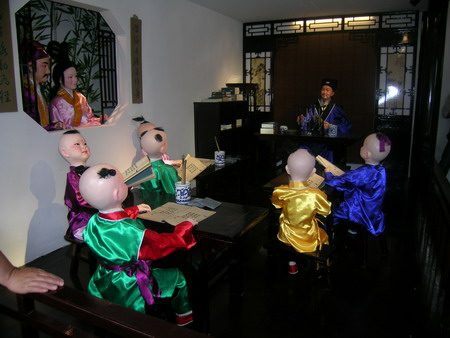Stories of Shen Wanshan
 |
|
Former Residence of Shen Wanshan |
There was once a wealthy family called Shen at Nanxun town in Zhejiang province at the end of the Yuan dynasty (1271-1368). The wife died of plague after a flood. The husband, Shen You, and their four sons hurriedly escaped to Zhouzhuang, miles away from Nanxun. But the two eldest sons still died of plague, leaving only two sons, Shen Fu and Shen Gui. Shen Fu, the third son, once disappeared for several days. When he returned, he excitingly told his family that he visited the city of Suzhou, telling them about business opportunities that would allow them to make money. The little boy changed his name to Shen Wanshan.
Start with farming
The Shen family only grew reeds and thatches at the begining. Through their dedicated work, the plot was cultivated and produced high yields. Thanks to fertile lands, mild temperature and convenient irrigation resources, Zhouzhuang boasted high yields of grains, rapes and silkworms. Shen family soon became a tycoon through their effective field management.
Donation from Mr Lu
Admiring Shen's wisdom and integrity, Lu Deyuan, a tycoon in Suzhou during the Yuan dynasty, contributed all his property to Shen family before leaving home to become a Taoist near Chenghu Lake. This contribution helped Shen to enlarge his wealth and contributions to the society.
Overseas commerce
Shen, on the one hand, continued to work on his fields. From Zhouzhuang, he shipped silks, china, grains and crafts overseas and imported jewelry, ivory, horns of rhinos, spices and medicines. The pursuit of wealth became his goal, and overseas commerce turned him into the richest man over the Yangtze Delta.
Magic basin to collect treasure
According to folk tales, Shen could turn one gold hairpin into many and turn one coin into many, which made him a millionaire.
He once helped Zhu Yuanzhang, the first emperor of the Ming dynasty (1368-1644) to build walls for defence. The Park of Xuanwu Lake, located in Nanjing, capital in Yuan dynasty, was once his private garden.
Female Musicians and banquets
He often invited officials and dignitaries to his luxurious home and offered them delicious food, beautiful women and happy entertainment. Three groups of female musicians were organized to play instruments and dance. At one evening's banquet, guests consumed 10 jars of wine and 30 plates of meat.














